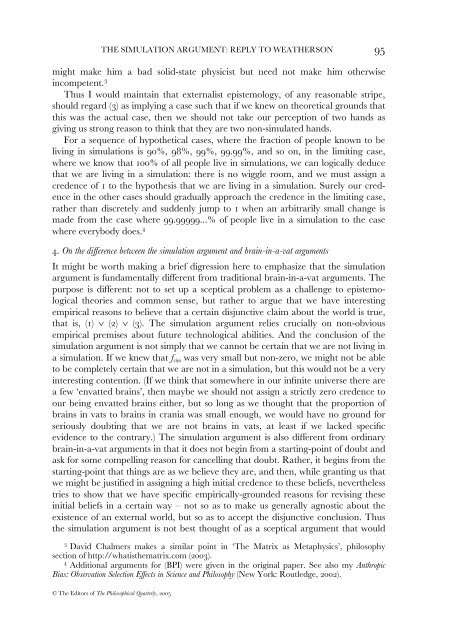Reply to Weatherson - The Simulation Argument
Reply to Weatherson - The Simulation Argument
Reply to Weatherson - The Simulation Argument
You also want an ePaper? Increase the reach of your titles
YUMPU automatically turns print PDFs into web optimized ePapers that Google loves.
THE SIMULATION ARGUMENT: REPLY TO WEATHERSON 95might make him a bad solid-state physicist but need not make him otherwiseincompetent. 3Thus I would maintain that externalist epistemology, of any reasonable stripe,should regard (3) as implying a case such that if we knew on theoretical grounds thatthis was the actual case, then we should not take our perception of two hands asgiving us strong reason <strong>to</strong> think that they are two non-simulated hands.For a sequence of hypothetical cases, where the fraction of people known <strong>to</strong> beliving in simulations is 90%, 98%, 99%, 99.99%, and so on, in the limiting case,where we know that 100% of all people live in simulations, we can logically deducethat we are living in a simulation: there is no wiggle room, and we must assign acredence of 1 <strong>to</strong> the hypothesis that we are living in a simulation. Surely our credencein the other cases should gradually approach the credence in the limiting case,rather than discretely and suddenly jump <strong>to</strong> 1 when an arbitrarily small change ismade from the case where 99.99999...% of people live in a simulation <strong>to</strong> the casewhere everybody does. 44. On the difference between the simulation argument and brain-in-a-vat argumentsIt might be worth making a brief digression here <strong>to</strong> emphasize that the simulationargument is fundamentally different from traditional brain-in-a-vat arguments. <strong>The</strong>purpose is different: not <strong>to</strong> set up a sceptical problem as a challenge <strong>to</strong> epistemologicaltheories and common sense, but rather <strong>to</strong> argue that we have interestingempirical reasons <strong>to</strong> believe that a certain disjunctive claim about the world is true,that is, (1) ∨ (2) ∨ (3). <strong>The</strong> simulation argument relies crucially on non-obviousempirical premises about future technological abilities. And the conclusion of thesimulation argument is not simply that we cannot be certain that we are not living ina simulation. If we knew that f sim was very small but non-zero, we might not be able<strong>to</strong> be completely certain that we are not in a simulation, but this would not be a veryinteresting contention. (If we think that somewhere in our infinite universe there area few ‘envatted brains’, then maybe we should not assign a strictly zero credence <strong>to</strong>our being envatted brains either, but so long as we thought that the proportion ofbrains in vats <strong>to</strong> brains in crania was small enough, we would have no ground forseriously doubting that we are not brains in vats, at least if we lacked specificevidence <strong>to</strong> the contrary.) <strong>The</strong> simulation argument is also different from ordinarybrain-in-a-vat arguments in that it does not begin from a starting-point of doubt andask for some compelling reason for cancelling that doubt. Rather, it begins from thestarting-point that things are as we believe they are, and then, while granting us thatwe might be justified in assigning a high initial credence <strong>to</strong> these beliefs, neverthelesstries <strong>to</strong> show that we have specific empirically-grounded reasons for revising theseinitial beliefs in a certain way – not so as <strong>to</strong> make us generally agnostic about theexistence of an external world, but so as <strong>to</strong> accept the disjunctive conclusion. Thusthe simulation argument is not best thought of as a sceptical argument that would3 David Chalmers makes a similar point in ‘<strong>The</strong> Matrix as Metaphysics’, philosophysection of http://whatisthematrix.com (2003).4 Additional arguments for (BPI) were given in the original paper. See also my AnthropicBias: Observation Selection Effects in Science and Philosophy (New York: Routledge, 2002).© <strong>The</strong> Edi<strong>to</strong>rs of <strong>The</strong> Philosophical Quarterly, 2005


